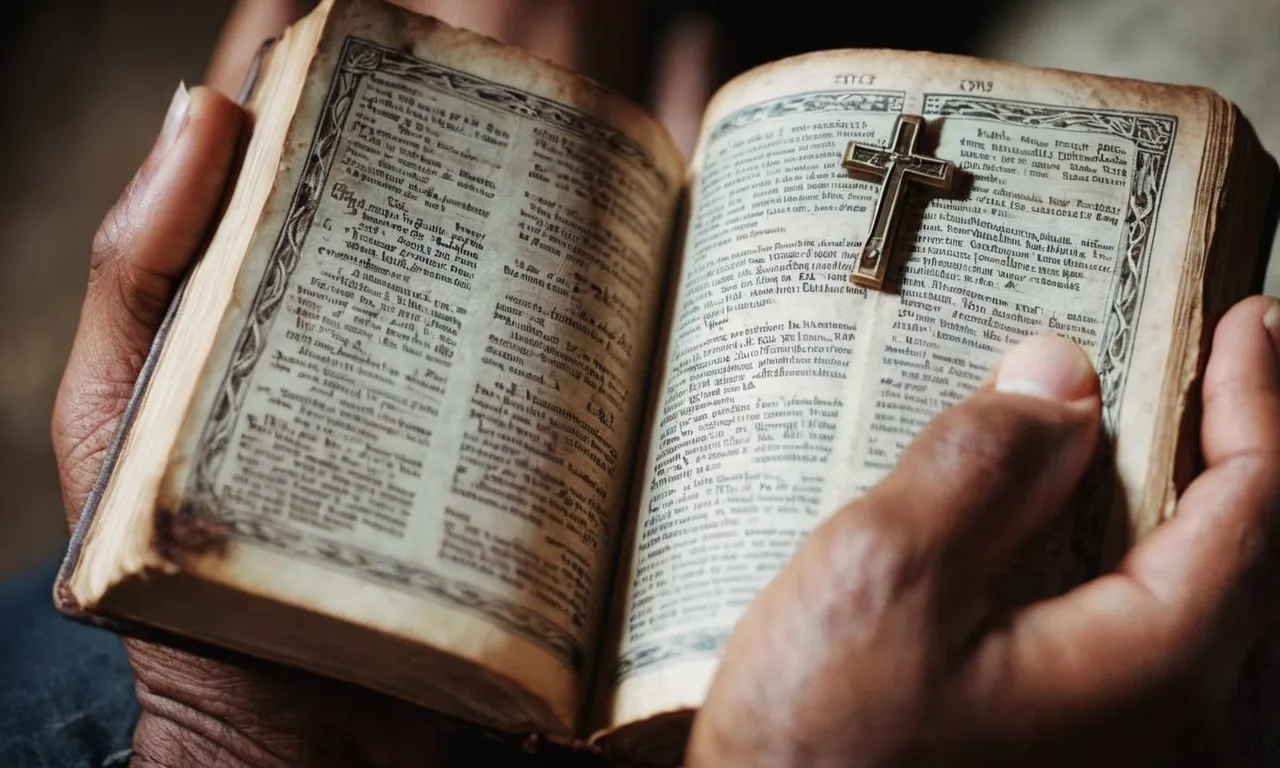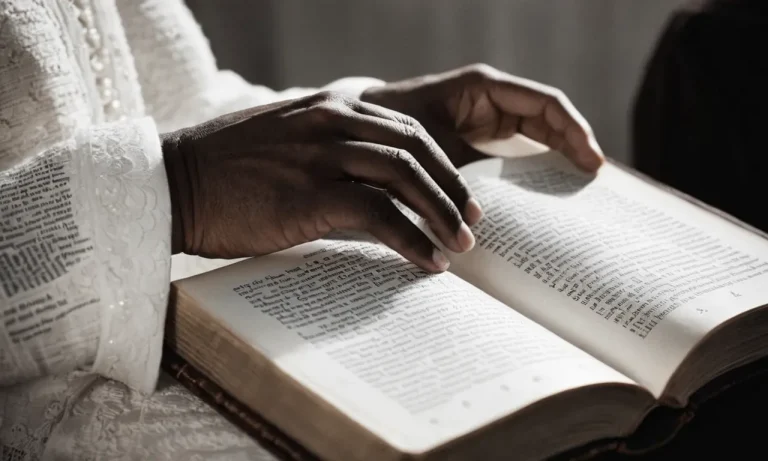Who Is The Leader Of Christianity?
Christianity is the world’s largest religion with over 2.5 billion followers globally. But unlike many other faiths, Christianity actually has no central governing authority or established leadership role.
Instead, it consists of diverse denominations and organizations that operate quite independently.
If you’re short on time, here’s the quick answer: There is no one single leader or head of the entire Christian religion. Different Christian denominations have their own organizational leadership structures, but there is no one leader that speaks for or makes decisions for all of Christianity.
In this comprehensive guide, we will explore the leadership structures of major Christian groups, explain why there is no central authority in Christianity, and discuss the historical and theological reasons behind this decentralized nature of the Christian faith.
Leadership Within Major Christian Denominations
The Pope and the Roman Catholic Church
The Pope is considered the supreme head of the Roman Catholic Church. As the successor of Saint Peter, the Pope serves as the bishop of Rome and the leader of the worldwide Catholic Church. The current Pope is Pope Francis, who was elected in 2013.
He resides in the Vatican City, the independent city-state enclaved within Rome that serves as the headquarters of the church. The Pope has authority over the Catholic Church’s bishops worldwide and he forms policies and speaks on behalf of the entire church.
The Ecumenical Patriarch and Eastern Orthodox Church
The Ecumenical Patriarch of Constantinople is considered the foremost leader of the Eastern Orthodox Church. Currently held by Patriarch Bartholomew I since 1991, the Ecumenical Patriarch is regarded as the “first among equals” within the Orthodox faith.
Unlike the centralized authority of the Pope in Catholicism, the Eastern Orthodox church leadership takes a more decentralized approach with power dispersed among the various patriarchs and autocephalous churches of the faith.
Even so, the Ecumenical Patriarch is highly regarded as a focal point of unity and leads the Holy Synod in coordinating Church policies.
Archbishops of Canterbury and the Anglican Communion
The Archbishop of Canterbury is the senior bishop and principal leader of the Church of England and the worldwide Anglican Communion, which encompasses 85 million members across 165 countries. Appointed by the British monarch, the current Archbishop is Justin Welby who assumed the role in 2013.
As primus inter pares or “first among equals” within the Anglican community, the Archbishop facilitates cohesion among the various churches and provinces of the Anglican faith, chairing the Lambeth Conferences held every decade to bring together bishops from around the world.
Presidents of the Latter Day Saints and Mormon Church
The President of The Church of Jesus Christ of Latter-day Saints is the top leader of the Mormon faith. He is considered a “prophet, seer, and revelator” by church members and authoritatively teaches doctrine for the church.
The current president is Russell M. Nelson who assumed office in 2018 after serving for 33 years on the Quorum of the Twelve Apostles, the second-highest governing body of the church. With over 16 million members globally, the Mormon church leadership is highly hierarchical with the President providing spiritual guidance as God’s spokesman on earth according to Latter-day Saints beliefs.
Moderators and Assemblies in Protestant Denominations
Unlike Catholic, Orthodox or Anglican churches, Protestant denominations often take a more decentralized or democratic approach to leadership. Major Protestant groups like Lutherans, Methodists and Baptists are not governed by a single individual but rather by elected or appointed councils, assemblies and moderators.
For example, in the Presbyterian church the elected Moderator of the General Assembly serves as a spokesperson and facilitator but does not wield executive power over the denomination. Among Baptists, each local congregation is self-governing so there is no central figurehead.
This dispersed leadership structure echoes Protestant principles of accessibility of authority and the “priesthood of all believers.”
Why There Is No Central Authority in Christianity
Christianity Lacks Concepts of Overall Religious Hierarchy
Unlike some other major world religions like Islam or Buddhism that have central authorities, Christianity has no overarching religious hierarchy. This stems in part from the lack of emphasis in the Bible and in the teachings of Jesus on establishing a centralized church authority.
For example, while the Pope is the head of the Roman Catholic Church, his authority is not recognized by Eastern Orthodox, Protestant, or other Christian groups. Each of these subgroups have their own leadership and theological interpretations.
This decentralization dates back to the earliest days of Christianity when it was just one of many religious movements in the ancient Mediterranean and Middle Eastern world.
Differences in Religious Authority and Scripture Interpretation
The lack of central authority has led to numerous divisions within Christianity over the religion’s 2000 year history. Major splits happened during the Great Schism of 1054 between Roman Catholics and Eastern Orthodox, and then the Reformation of the 16th century which saw the rise of Protestantism.
These divisions centered around differences in views on religious authority, salvation theology, scripture interpretation, and other doctrinal issues. For example, Protestants rejected the supreme authority of the Papacy, instead emphasizing the authority of scripture alone.
They also tended towards more focus on individual relationships with the divine rather than strong church hierarchies.
Political and Theological Divisions Through History
Political factors also exacerbated differences between Christian groups as church and state intermingled. For instance, the English Reformation was both a theological break from Roman Catholicism and a political move by King Henry VIII to consolidate more power.
The interplay between political and religious disputes among Christian subgroups continues up to the present day.
In the end, the decentralization in Christianity reflects both ancient roots and epochal breaks in church history. Without a central worldwide church government, diverse interpretations of the religion branched out.
This continues to be a source of both richness and conflict in Christianity to this day.
Origins of Decentralized Christian Leadership
Jesus Did Not Establish Clear Line of Succession
Jesus did not explicitly establish a clear line of succession or central governing authority when he appointed the twelve apostles. The apostles had authority to preach the gospel and lead local congregations, but there was no centralized institution.
The apostle Paul established many early churches throughout the Roman empire, but did not assert hierarchical control over them. This decentralized structure was partly by circumstance, but also aligned with Jesus’ teachings about servant leadership and equality among believers.
Growth and Geographical Spread of Early Christian Groups
In the first few centuries AD, individual Christian congregations emerged in different geographical locations around the Mediterranean and Middle East. There was no overarching church hierarchy, and each local group was self-governing under the leadership of elders/overseers (episkopoi) and servants/deacons (diakonoi).
As the number of Christians grew rapidly, these congregations were scattered over a wide area making centralized leadership impractical.
Lack of Institutions in Persecuted Early Church
The early church did not have established institutions since it was illegal in the Roman empire prior to 313 AD. Persecution and martyrdom of Christians meant there could not be public church structures or leadership. Instead, Christians met in small home gatherings led by locally appointed elders.
Despite the lack of central organization, these small decentralized Christian communities spread successfully through informal networks and missionary work.
Conclusion
While the decentralized nature of Christian leadership has led to much diversity of theology and practice, attempts have periodically been made to establish greater unity. Movements like the ecumenical movement have sought increased cooperation and decreased conflict between different Christian traditions.
However, for the time being, there continues to be no central figurehead or decision-making body for global Christianity.
The lack of centralized leadership is simply an intrinsic aspect of the Christian religion as it has developed over two millennia. Most Christians are comfortable accepting their own church hierarchies and leadership without feeling the need for an overarching authority structure for the faith as a whole.







